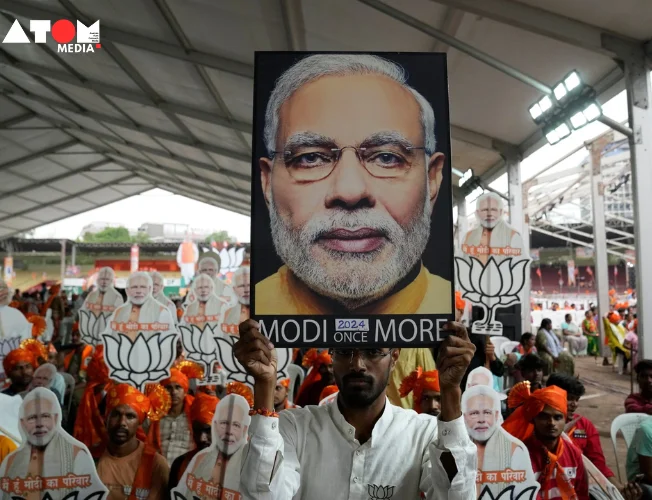Mumbai, India – As India’s 2024 election campaign unfolded, a significant advertising controversy emerged involving the Central Bureau of Communication (CBC), an agency meant to promote government plans. Instead, it has been accused of using public funds to bolster Prime Minister Narendra Modi’s Bharatiya Janata Party (BJP) by echoing its election slogans.
The Catchphrase Controversy
In November, the BJP introduced the catchphrase “Modi ki guarantee” (Modi’s guarantee), emphasizing Modi’s personal commitment to voters. Simultaneously, the CBC launched a remarkably similar campaign: “Modi sarkar ki guarantee” (Modi government’s guarantee). These government-funded ads closely mirrored BJP’s election messaging, raising questions about the misuse of public funds for partisan purposes.
One such ad, aired on February 23, featured a young entrepreneur reassuring his father about his career choice, citing “Modi’s guarantee” of a supportive startup environment. Despite being government-funded, the advertisement closely aligned with BJP’s campaign themes, suggesting an overlap between government communication and political propaganda.
Opposition Backlash and Legal Complaints
On March 22, the Indian National Congress, the principal opposition party, filed a complaint with the Election Commission of India (ECI). They argued that the CBC’s advertisements breached election rules by utilizing public resources for political gain. This complaint highlighted concerns about the ability of non-partisan institutions to maintain a level playing field in the elections.
An investigation by Al Jazeera revealed the extent of the CBC’s expenditure on these government advertisements, which appeared to mimic BJP’s slogans. The CBC spent approximately 387 million rupees ($4.65 million) on Google ads in just under four months, making it the top pre-election spender on the platform. This spending outpaced even the BJP’s 314 million rupees ($3.7 million) expenditure on Google ads during the same period.
Historical Context and Pattern of Misuse
Accusations of the BJP leveraging neutral government agencies for political gain are not new. Critics argue that this reflects a broader pattern under Modi’s leadership. Akshay Marathe, a spokesperson for the Aam Aadmi Party (AAP), accused Modi of centralizing power and using state resources to promote his party’s agenda.
The Congress’s complaint to the ECI also accused the Modi government of politicizing the armed forces, a charge stemming from advertisements that portrayed Modi as part of the families of Indian soldiers. These ads were among the CBC’s costliest, highlighting the blurred lines between government promotion and political campaigning.
Expanding Government Advertising Budgets
In May 2023, the Modi government significantly increased the CBC’s budget by 275 percent, from 2 billion rupees ($24 million) to approximately 7.5 billion rupees ($90 million). This increase required ministries to allocate 40 percent of their advertising budgets to the CBC, boosting its resources ahead of the election year.
Additionally, a new Digital Advertisement Policy adopted in November 2023 allowed the CBC to extend its advertising reach to digital platforms like Google. This policy shift enabled the CBC to launch a flood of digital ads, promoting messages that closely resembled BJP’s campaign slogans.
The Scale of Digital Political Advertising
The CBC’s 387 million rupee spending on Google ads represents a significant portion of the broader surge in digital political advertising. Compared to the pre-2019 election period, the total political advertisement spend on Google before the 2024 elections increased dramatically to nearly 1.3 billion rupees ($15.9 million). This surge underscores the growing importance of digital platforms in political campaigns.
A 2023 survey by the Google News Initiative and Kantar revealed that 93 percent of Indian language users access news via YouTube, and about 80 percent of Indian internet users eligible to vote consume content on the platform. The CBC capitalized on this trend, directing over 90 percent of its Google ad spend to video content, further blending government messaging with political advertising.
Regulatory Oversight and Challenges
The 2015 Supreme Court guidelines stipulated that government advertising should not promote political interests. However, the effectiveness of these regulations has been questioned. The Committee on Content Regulation of Government Advertisements (CCRGA), established to monitor such ads, often faces criticism for its limited power and perceived bias.
Former chief election commissioner S.Y. Quraishi highlighted that while the Election Commission can act against campaign violations, its mandate begins only after elections are announced. Consequently, the CBC ceased advertising on March 15, the day national elections were formally declared.
Institutional Integrity and Political Influence
The BJP has consistently refuted allegations of bias, pointing to opposition victories in state elections as evidence of a fair electoral process. However, transparency advocates argue that the government’s overwhelming majority allows it to exploit public resources more freely, undermining institutional checks and balances.
Niranjan Sahoo, an expert on political funding reforms, noted that accountability mechanisms typically function better when the ruling government lacks a “brute majority” and must rely on coalition partners. This dynamic ensures a more balanced use of state resources.
Implications for Democratic Processes
The CBC’s advertising controversy highlights critical issues regarding the use of public funds in political campaigns. As India’s democratic institutions grapple with maintaining electoral integrity, the blurred lines between government promotion and political campaigning pose significant challenges.
Ensuring a level playing field in elections requires robust regulatory frameworks and vigilant oversight. As India progresses through its 2024 elections, the role of government agencies in political advertising will remain under scrutiny, shaping the discourse on transparency and fairness in democratic processes.
By optimizing this article with relevant keywords such as “BJP election slogans,” “Indian government advertising controversy,” “2024 Lok Sabha elections,” and “political advertising in India,” it aims to reach a broader audience interested in these critical issues.
Read more: Marketing News, Advertising News, PR and Finance News, Digital News





